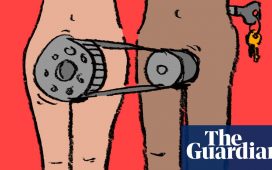Matthew Bourne never fancied remaking Romeo and Juliet. “I resisted it for such a long time,” says the choreographer. “I thought it was overdone – not just in dance, but in every medium. I thought it was impossible to come up with something different.”
He’s right that Shakespeare’s most popular play has been performed endlessly. In dance, there are major ballets by everyone from Kenneth MacMillan to Rudolf Nureyev, Alexei Ratmansky and Mats Ek. There’s even a hip-hop take by Rennie Harris, a multiracial South African version by Dada Masilo and a Rasta Thomas show where the star-cross’d lovers get married to the sound of Lady Gaga.
Not that artists should feel ashamed of returning to, and rewriting, the work, given that Shakespeare himself stole the story from an Italian novella. Right now, on tour in the UK, you can catch a dance-theatre show by Lost Dog that upturns the original narrative (more of which later) – as well as, yes, Bourne’s own version, which is currently in Leicester.
So Bourne caved in to the charms of Romeo and Juliet in the end. What changed his mind? “I was excited by the idea of casting it young,” says the choreographer, who is now 59. In the play, Juliet is only 13. While Franco Zeffirelli’s 1968 film famously cast teenagers, and Claire Danes was only 16 when she starred in Baz Luhrmann’s spectacular film, in most dance productions the performers, and choreographers, are inevitably older.

Bourne’s production – his first new work since 2016’s The Red Shoes – not only uses the younger dancers from his company, New Adventures, but groups of dancers aged 16 to 19 in every city it tours to – a talent development initiative similar to the one that made his production of Lord of the Flies so memorable. There’s also a team of young creatives working on design, lighting, orchestration and conducting. And, working alongside Bourne, is the talented 22-year-old choreographer Arielle Smith.
It’s not just about the age of the people on stage, but the whole prism through which Bourne sees the work. “It’s a story about young people, young love. I thought maybe I should try to capture what it’s really like,” he says. “It’s not really pecks on the cheek, is it? It’s kissing till your mouth is sore. Once young people go for each other, they really go for each other. I thought a bit of that would be good.”
Bourne’s shows always come with a twist: a gender-switched Swan Lake, Sleeping Beauty turned into a vampire tale. But all he’s revealing about this one is that it’s set in some kind of an institute, slightly in the future, where men and women are kept separate. “You’re not quite sure what it is,” says Bourne. “A borstal, a prison, a school, something to do with mental health? An excess of feeling is frowned upon – there may be young people who have too much feeling.”

One of Bourne’s favourite quotes about Romeo and Juliet comes from Arthur Laurents, who wrote the book for West Side Story, probably the play’s most famous reimagining. “Someone said to him, ‘What’s wrong with these kids, why do they fight?’ And he said, ‘Too much feeling.’ They had to get it out somehow. I liked that.”
While being a teenager is all about feeling things intensely, it can tip over into something more troubling. “It’s a topical subject, young people’s mental health,” says Bourne. “So that was something to delve into, young people having trouble dealing with big emotions.”
Bourne calls the story “a movable feast” and, during rehearsals, has repeatedly changed the plot and rewritten the scenario. “I don’t feel reverential towards Shakespeare because we’re not really doing Shakespeare,” he says. “We’re not using the words – we’re in a different medium. So I really don’t feel tied to them. I feel like I want to represent Prokofiev more than Shakespeare, that’s my script.”
For ballet-goers, Prokofiev’s 1935 score is as essential to Romeo and Juliet as the plot, especially its famous Dance of the Knights, the thrilling, we-mean-business piece of music that’s been heard everywhere from The Apprentice to Sunderland football club. But Bourne has changed the score as well: it’s been edited and reorchestrated by Terry Davies for an ensemble of 15, who will play live at every tour venue.
“It’s not the full lush sound you’d get with an orchestra,” says Bourne. “It’s a very different colour: quirkier. It suits the production much better.” Any tinkering, he says, requires approval from the Prokofiev estate. “Getting permission to rework it – now that really did get me excited.”

While Bourne’s Romeo and Juliet is all about youth, Lost Dog’s writer and director Ben Duke came at it from an opposing angle. His show is an alternative history, where the star-cross’d lovers didn’t die in that Veronese tomb, but eloped to Paris and now find themselves jaded and 40-ish with their marriage in crisis.
Duke, who has previously turned Milton’s epic poem Paradise Lost into a meditation on parenthood, had been wanting to make a work about the complexities of long-term relationships. “Without doing the obvious – you know, ‘It starts good and gets worse.’” There is certainly a bit of that, though. “Then I was thinking how we are obsessed with youth and the beginnings of things, and I realised how much I had been fed the narrative of, well, Romeo and Juliet.”
As a teenager, Duke saw a production on a school trip to Stratford and was surprised to experience the heartbreaking frustration as the tragedy unfolded, even though you know exactly how it was going to end. “I’d read the play, I knew what was going to happen, and yet here I was rooting for these people. For Romeo to get to the tomb sooner, or get the message Juliet sends. It’s that strange human thing of hope.”
But the great thing about being a theatre-maker, he realised, is that it’s a job where you can rewrite stories. “And that’s a very exciting discovery,” he says. “We can change the timing here for a few seconds and suddenly we’ve got a whole different story.”
The result is a brilliant piece of dance theatre that’s honest and insightful about long-term relationships – and very funny. The couple, played by Duke and Solène Weinachter, are troubled by the “ideal” beginning they have somehow decided their relationship had: their mythologising is chipping away at their happiness, especially when they find their memories of events don’t match.

“The myth of how your relationship began can provide constant food for it,” says Duke, who is 43. “When we were younger, I had so many conversations with friends, asking, ‘Is this the one?’ I think there’s this feeling that if you don’t have this lightning moment – like Leonardo DiCaprio and Claire Danes first seeing each other through the fish tank in Luhrmann’s film – does that mean it’s not right?”
Real, enduring, grown-up love is a process, one that’s full of complexity, compromise and divvying up the household chores, whereas Romeo and Juliet “are just dealing with this chemical reaction moment and then running with it to the absolute limit”. That simplicity, says Duke, is a huge part of the story’s appeal.
The play still speaks to us, he says, because romantic love is now more idealised than ever. “We’re in a time when the importance of the individual and the power of our emotions is paramount. We can’t get enough of Romeo and Juliet because they’re just following their emotional direction.”
The irony is that in Shakespeare’s day, many marriages would not have been based on romantic love at all – and the playwright was hardly advocating his tale of woe as a template. The tide is turning a little, though, thinks Duke , who points to such hit TV comedies as Fleabag and Catastrophe. “They’re done through humour but what they’re saying is that love’s not as simple as Hollywood makes out.”
If we are beginning to revel more in the messiness of life, could that ever undermine the emotional purity and hormonal thrill of true love’s sucker punch? Not likely, says Bourne. “We all love a great love story,” he says. “A great, tragic love story.”
• Matthew Bourne’s Romeo and Juliet is at Curve, Leicester, until 18 May. Lost Dog’s Juliet & Romeo is at the Place, London, 18-22 June.














